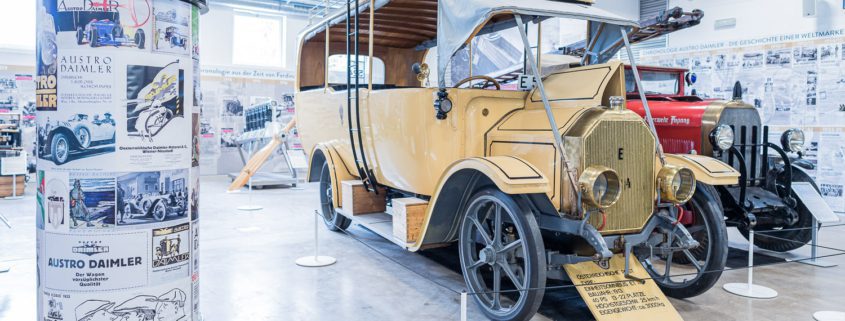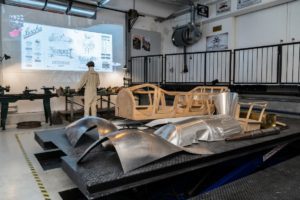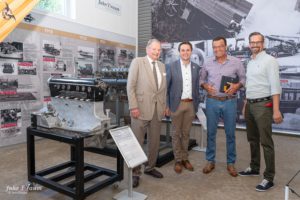Special exhibition: The history of Austro Daimler from 1899 to 1935
New exhibition hall and exhibits that have never before been shown in the fahr(T)raum Ferdinand Porsche Worlds of Experience!
During the coronavirus-induced break, the fahr(T)raum team has been busy planning a large special exhibition on the history of the Austro Daimler automotive brand during the time of Ferdinand Porsche. The exhibition presents the diversity of the company’s products in a clear and detailed manner and is divided into four thematic areas: Austro Daimler – the brand, commercial vehicles, rail and aviation. A demonstration workshop and interactive elements take visitors back to that period in time. In order to maintain an overview, an Austro Daimler engine chronology was developed at the time of Ferdinand Porsche, which shows the milestones of the automotive brand in the historical context.
Demonstration workshop with interactive elements.
Jakob Iglhauser, Managing Director of the fahr(T)raum Ferdinand Porsche Worlds of Experience, is pleased to be able to present exhibits that have never before been shown, such as an ADGR all-terrain vehicle, an ET13 post bus, a draisine and the pioneering 6 and 12-cylinder aircraft engines, a Hansa Brandenburg C1 engine with 6 cylinders and 225 PS as well as the ADR engine with 6 cylinders and 70 PS, narrow-gauge railway engines with 3.5 and 6 PS and the M12 marine engine. A separate building has even been built directly adjacent to the vintage and classic car museum in order to have enough space for the new exhibits.
Austro Daimler produced not only luxury motor vehicles and commercial vehicles, but also hunting wagons, trucks, buses, rail vehicles and aircraft engines. The first vehicle produced by “Österreichische Daimler-Motoren-Commanditgesellschaft, Bierenz, Fischer & Co.”, founded in Wiener Neustadt in 1899, was a “4-horsepower” two-cylinder engine with an electromagnetic ignition (built in 1900).
Ferdinand Porsche started his career as Technical Director at “Österreichische Daimler Motoren Gesellschaft” on 19 July 1906 and managed the company successfully together with Eduard Fischer and Wilhelm Strauß until he left in 1923. Highlights of his career at Austro Daimler included the development of the Maja 24/28 HP, the first purely petrol-driven car, the type 22/86 “Prinz Heinrich” sports car from 1910 and the Sascha ADS-R racing car (built in 1922).
You can see in the exhibition what happened after Ferdinand Porsche’s departure, how the company restructured itself in times of war and what ingenious inventions it produced.
From left: Mr. Ernst Piëch, Mayor Michael Schwarzmayr, Max Lampelmaier and CEO Jakob Iglhauser.
Special exhibition Austro Daimler:
30. July 2020 – 29. September 2021
daily from 10:00 am to 5:00 pm
Quellen
This might also interest you:









Gunter Haug reads from his book „Ferdinand Porsche – Ein Mythos wird geboren”
/v Geschichte, Lebensstationen, Uncategorized @csOn 15 March we will be welcoming Gunter Haug to fahr(T)raum Mattsee. The author will perform a reading of his work „Ferdinand Porsche – Ein Mythos wird geboren / A myth is born“ in German at 7:30 pm. The newspaper, radio and television editor and author of more than 30 books has dealt with the […]
Ferdinand Porsche at Austro-Daimler – Career highlights
/v Geschichte, Lebensstationen, Rennautos, Sonstige Fahrzeuge, Uncategorized @csFollowing the departure of Paul Daimler from the Austro-Daimler plants in Wiener Neustadt in 1905 – he replaced Wilhelm Maybach in the design office in Stuttgart – Emil Jellinek, diplomat and businessman, participated in the company. He transformed what he considered the „obsolete“ plant into a modern car factory and brought a brilliant young engineer […]
Auto Union Type C – most successful German Grand Prix racing car in 1936!
/v Geschichte, Motoren, Rennautos, Uncategorized @csThe Auto Union Type C was the most successful German Grand Prix racing car in 1936. It won three out of five Grand Prix races, half of the circuit races and all hill-climbs in which Auto Union participated. In addition, the Type C set more than thirty world records. In order to minimise the financial […]